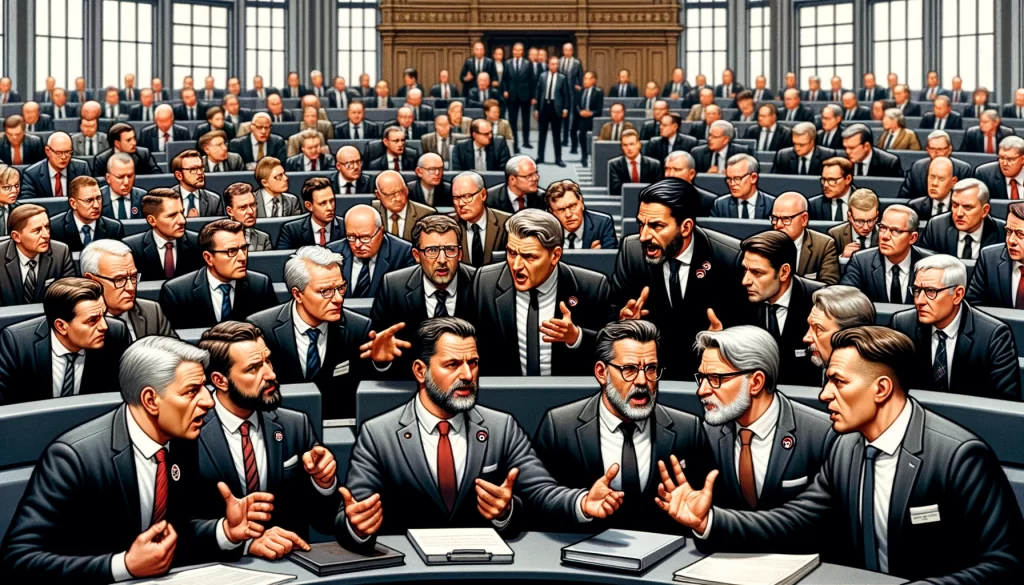To participate in a secret meeting in the German Parliament, lawmakers are required to lock their phones and leave them outside. They are also prohibited from taking notes inside the meeting. However, the presence of members from the Alternative for Germany (AfD), a far-right political party known by its German acronym, makes some politicians question the effectiveness of these security measures.
Recently, the AfD has been in the spotlight due to troubling connections with pro-Kremlin elements. A prominent AfD politician faced allegations of receiving funds from pro-Kremlin strategists. Additionally, a parliamentary aide from the AfD was linked to a Russian intelligence operative, and several AfD state lawmakers visited Moscow to observe what were seen as staged elections in Russia.
Erhard Grundl, a member of the Green party and the Parliament’s foreign affairs committee, expressed his concerns: “To know with certainty that sitting there, while these sensitive issues are discussed, are lawmakers with proven connections to Moscow — it doesn’t just make me uncomfortable. It worries me.”
The AfD dismissed these worries as unfounded. Despite these dismissals, the pattern of the party’s interactions with Russian interests raises significant security concerns. Roderich Kiesewetter, deputy head of the Parliament’s intelligence committee and a Christian Democrat, criticized the AfD’s actions on social media, describing the party as “the long arm of the terrorist state Russia.”
The situation has become more alarming since Russia began its full-scale invasion of Ukraine in February 2022. The invasion has heightened fears across Europe about Moscow’s efforts to infiltrate and weaken Western cohesion through various means, including establishing connections with right-wing political groups.
These concerns are magnified as the European Parliament elections approach in June, where far-right parties like the AfD are expected to perform well. The AfD, which opposes military aid to Ukraine and sanctions against Russia, aims to become a major political force in upcoming state elections in Germany. This could potentially lead to the AfD gaining control of a state government, a scenario that worries many due to the potential for increased Russian influence.
Martina Renner, a lawmaker from the Left party who is part of the Parliament’s domestic security committee, highlighted the risks: “This would be a whole new situation with regards to Russia, where the people making propaganda, passing information, could also actually be in power.”
The controversy extends beyond the AfD. Historically, German lawmakers, including members of the Social Democrats and the Christian Democrats, have maintained close economic ties with Russia. However, following the Ukraine war, mainstream politicians have distanced themselves from these connections, in contrast to the AfD, which seems intent on strengthening them.
Recent investigations by Belgian authorities into payments made to European lawmakers have fueled further speculation about the depth of Russian influence, with AfD member Petr Bystron facing significant scrutiny. In 2022, Bystron led calls questioning the German government’s actions regarding Viktor Medvedchuk, a pro-Putin Ukrainian oligarch, after his arrest in Ukraine.
Medvedchuk, who had founded a pro-Moscow political party and owned several pro-Kremlin TV channels in Ukraine, was later exchanged for prisoners and sent to Russia, where he continues to promote Russian interests.
Bystron, an AfD candidate in the European elections, has made multiple appearances on the media platform Voice of Europe. During these appearances, he positioned his party as a defender against what he called “globalist” parties and reiterated his stance against Western sanctions on Russia.
He and several other AfD members are now under suspicion of receiving payments, according to authorities. However, no charges have been filed as of yet. When contacted for a comment by The New York Times, Bystron’s office did not respond.

Recently, Bystron dismissed the allegations as a plot against the AfD. “Before every election it is the same: defamation with the help of the secret services,” he stated to Deutschland Kurier, a website linked to the AfD.
In defense against criticism regarding the AfD’s supportive inquiries about Medvedchuk, a spokesman for the AfD’s parliamentary group firmly rejected what they called attempts to discredit their opposition work by other parties, which they believe is motivated by tactical political maneuvers.
Konstantin von Notz, a member of the Green party and head of Parliament’s intelligence oversight committee, referred to the accusations against Bystron as just “the tip of the iceberg.”
A recent investigation conducted by The Insider and Der Spiegel revealed what they claimed to be encrypted messages from last year between Wladimir Sergijenko, an aide to an AfD Parliament member, and a Russian intelligence operative. The messages discussed plans to challenge the German government’s arms deliveries to Ukraine through a legal case challenging the German government’s actions on the grounds that parliamentary approval had not been sought. The communications indicated that this plan required “media and financial support.”
Last July, the AfD filed a lawsuit that closely resembled the plans discussed in the encrypted messages. However, the party denied any connection between its lawsuit and Sergijenko, who has dismissed the allegations of his ties with Russian intelligence as “fictitious.”
The concerns about Russian influence extend beyond individual actions, suggesting deeper ideological connections within the AfD.
A senior aide to Tino Chrupalla, an AfD leader, posted an article on a lesser-known website associated with Aleksandr Dugin, a right-wing ideologue influential in Russian politics. Dugin’s ideas, which include concepts like “Eurasianism,” are increasingly echoed in AfD rhetoric.
Chancellor Olaf Scholz remarked this month that many statements from AfD leaders about Europe and security closely resemble those made by Putin.
According to Una Titz, an analyst at the Amadeu Antonio Foundation, the AfD’s narrative about Russia and Europe began to change around 2018 after Russian authorities invited AfD members to observe elections. Since then, numerous AfD delegations have visited Russia, with one parliamentarian even considering establishing an office in Moscow, though this plan was ultimately dropped after objections from other lawmakers.
Ms. Titz described these developments as part of a deliberate strategy by Russia to undermine Western democracies through what she termed “nonlinear warfare.”
While the AfD’s connections with Russia are the most visible, some officials believe this issue is indicative of a broader problem of Russian infiltration into German political systems.
These officials note that many parliamentary aides lack security screenings, raising concerns about their backgrounds. Martina Renner, from the domestic security committee, highlighted the focus on the AfD but warned that Russian efforts to infiltrate are not limited to smaller parties. “They want them everywhere,” she said, indicating a broader strategy to gain influence across the entire political spectrum in Germany.
This article is based on the following article:

Background Information
By understanding these elements, readers will have a more comprehensive view of the political dynamics discussed in the article, particularly concerning the AfD’s actions and the broader implications for German and European politics.
- Alternative for Germany (AfD):
- The AfD is a far-right political party in Germany, established in 2013. Initially focused on opposing the euro currency and the European Union’s bailout measures, the party has since shifted its focus towards anti-immigration policies, nationalism, and skepticism towards the EU.
- The AfD has gained significant attention and electoral support for its strong stance on issues like migration, national identity, and criticism of mainstream German politics.
- German Political System:
- Germany is a federal parliamentary republic. The government is based on a democratic constitution emphasizing the separation of powers across judicial, executive, and legislative branches.
- The Bundestag is the lower house of Germany’s national legislature and plays a crucial role in the country’s politics, including the drafting and passing of legislation.
- Espionage and Security in Politics:
- In political contexts, especially involving national security, sensitive information is often discussed in confidential settings to prevent espionage or unauthorized information leaks.
- Espionage refers to the practice of using spies to obtain secret information about a government or a competing organization.
- Russia’s Foreign Policy and Influence Operations:
- Russia, under President Vladimir Putin, has been known to use a variety of tactics to exert influence abroad, including support for right-wing movements and political parties in Europe.
- Influence operations are efforts by a government or group to affect the public perception or decision-making of another nation, often to fulfill strategic objectives. This includes the dissemination of propaganda, financial support for favorable political parties, and cyber operations.
- Recent History of Russia-Germany Relations:
- Relations between Russia and Germany have been complex, characterized by economic cooperation and political tensions. Energy, particularly natural gas, is a significant aspect of their economic interaction.
- Since Russia’s annexation of Crimea in 2014 and the subsequent conflict in Eastern Ukraine, Germany has been involved in diplomatic efforts regarding Ukraine and has faced pressure to respond to Russian actions.
- European Parliamentary Elections:
- The European Parliament is the legislative branch of the European Union, elected by EU citizens every five years. These elections are significant as they determine the composition of the body that makes decisions affecting all member countries.
- Far-right and nationalist parties have gained ground in some recent European elections, often campaigning on anti-EU platforms.
- Legal and Illegal Political Funding:
- Political funding refers to the means through which political parties or candidates raise funds for their campaigns. While there are legal routes for funding, illegal funding can involve undisclosed donations or foreign interference, which are often subject to investigations and sanctions.

Debate/Essay Questions
- Should political parties with proven foreign ties be banned from participating in national elections?
- Is it justified for governments to monitor and restrict political parties based on their foreign associations?
- Is the rise of nationalist parties in Europe a legitimate expression of public will or a threat to democratic values?
- How should democracies respond to parties that utilize disinformation as a tactic to gain political power?
Please subscribe to Insight Fortnight, our biweekly newsletter!
